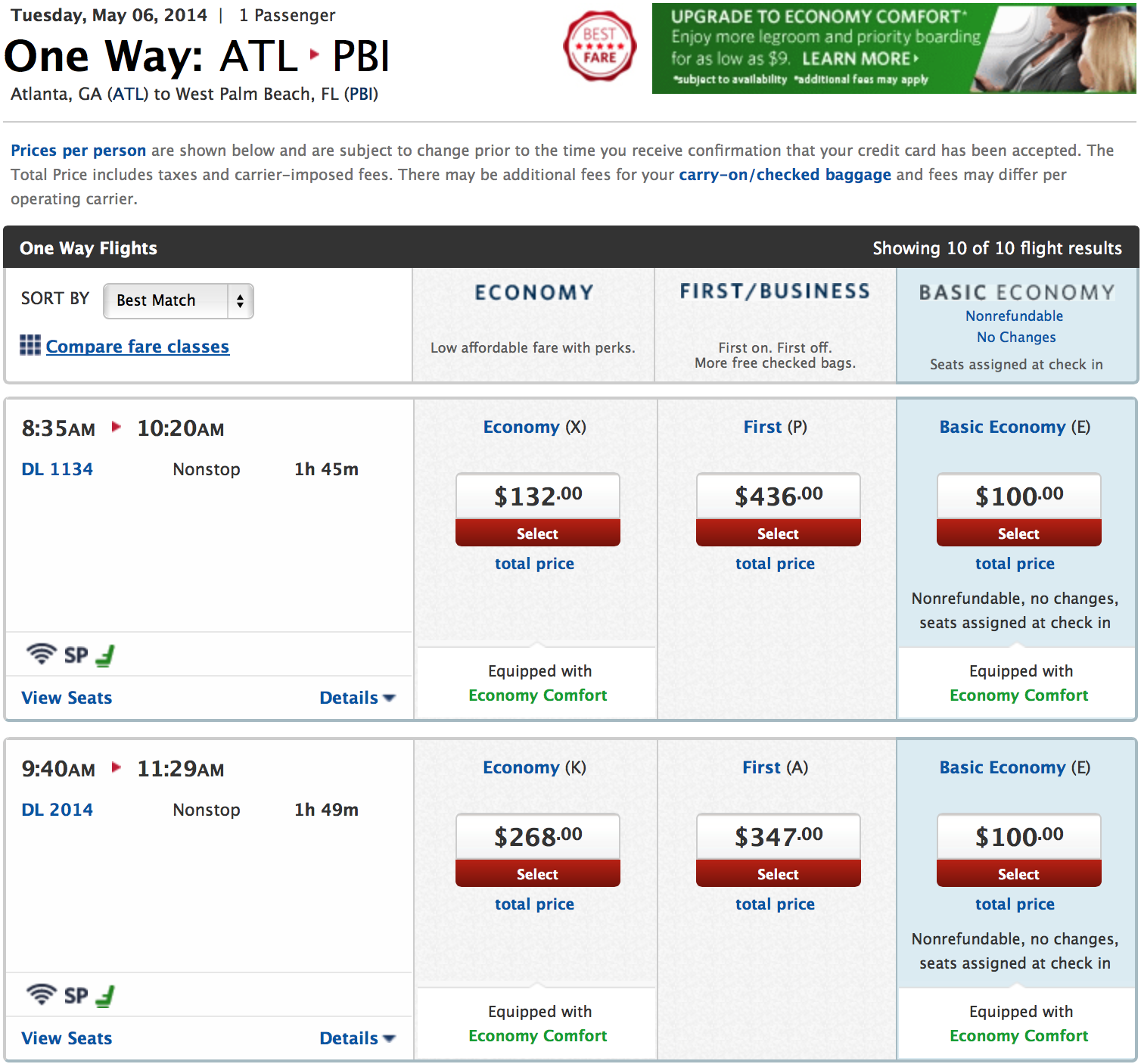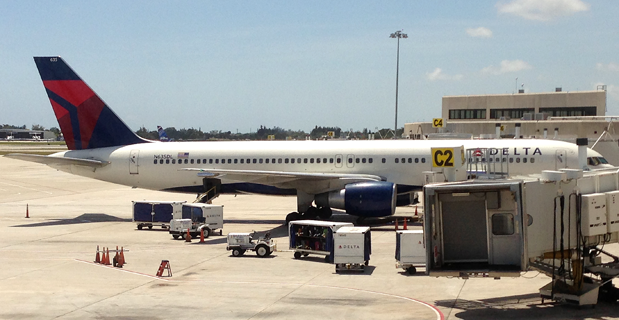Basic Economy fares were initially created to compete with the fares of ultra-low-cost airlines — but are Basic Economy fares basically false advertising?
Are Basic Economy Fares Basically False Advertising?
When booking a reservation at a resort property, a mandatory resort fee is likely added to the advertised rate, causing consumers to pay more than originally expected for their stay.
Similarly — but certainly not exactly the same — the lowest advertised rate of airfare is now usually Basic Economy; but that is usually not found out until a consumer enters the process of purchasing a ticket. Worse is that the restrictions of Basic Economy fares differ with each airline; and airlines tend to tinker with them to squeeze out more profits. The latest example is from Air Canada, which officially announced “adjustments” to its Basic Economy fares on Wednesday, December 4, 2024 effective as of Friday, January 3, 2025. Carry-on baggage will no longer be included with Basic Economy fares, as customers will only be permitted to bring one personal article when traveling on flights:
- Within Canada
- To and from the United States — including Hawaii and Puerto Rico
- To and from Mexico, Central America, and the Caribbean
Passengers rarely travel to distant places with only one personal article; so the advertised lowest fare of any airline for flights of long distances — especially transoceanic flights — is basically not what the consumer will pay. A carry-on bag, seat assignments, and other ancillary products and services need to be purchased for an extra fee each. Purchase enough of the ancillary items; and the consumer may wind up paying more than the regular economy class fare and still suffer from the other restrictions.
Other examples of restrictions with Basic Economy fares include:
- A fee is charged for carrying a bag aboard an airplane that is operated by United Airlines
- SkyMiles are not earned and elite status — even the top tier level — is not recognized by Delta Air Lines
- With numerous airlines, passengers with Basic Economy tickets are last to board the airplane
Even worse is that the scourge of restrictions of Basic Economy fares has creatively spread to other fare classes with some airlines. For example. LATAM Airlines has four classes of fares of economy class: Basic, Light, Full, and Premium Economy.

Note that even if you spent an extra $32.20 one way — not round trip — to “upgrade” your ticket from a Basic fare to a Light fare, you still must pay extra for advance seat assignments. If you want the privilege to select your seat in advance, be prepared to cough up an extra $67.85 — again, one way and not round trip — from the Basic fare.
Another example is one I recently experienced: paying for a Main Cabin fare with American Airlines but being required to pay for advance seat assignments with a partner airline via a codesharing agreement on the same itinerary.
The Introduction of Basic Economy Fares
Basic Economy fares were first introduced as a new class of airfare back in 2012 by Delta Air Lines, which classified them as E fares and became the least-expensive airfare you could purchase at that time. They were even less expensive than a T fare, which prior to the introduction of Basic Economy was traditionally the cheapest airfare you can purchase with Delta Air Lines. As one result, Basic Economy fares caused a bit of controversy on FlyerTalk.
At that time, three differences with E fares versus other fares for seats in the economy class cabin included:
- No refunds at all under any circumstance, no matter what was the reason
- No changes were permitted at all at any time
- Your seat is assigned to you when you check in on the day of your flight — not even when you check in via the Internet before you arrive at the airport
You were still able to earn the full amount of Delta Air Lines SkyMiles and credit towards elite level status for the next year that other economy class fares will earn for you — based on dollar value, of course.
My Experience With Basic Economy Airfares in 2014
I personally flew as a passenger of Basic Economy fares on Delta Air Lines twice in 2014. I did not like the idea of not being able to select a seat in advance — but I wanted to see what would happen when I purchased an E fare ticket. Both purchases were for a one-way flight from Atlanta to West Palm Beach; and both times, the flight cost $89.00 — including all taxes and fees — which is what this flight used to cost with a T fare not all that long prior to the flights; although the cost had since increased to $100.00 in 2014, as shown in the graphic below:

The first time, I received an aisle seat in the approximate middle of a Boeing 757-200 aircraft. The seat next to me was empty — but then again, the aircraft itself was not full. I was quite pleased.
For comparison purposes is a screen shot of the cost of fares of two flights operated by Delta Air Lines from Atlanta to West Palm Beach on Tuesday, May 6, 2025 to show a comparison between the Basic Economy fare, the Main Cabin fare, the Comfort+ fare, and the First Class fare.

Despite harsher restrictions, the Basic Economy fare has increased by $69.00 from $100.00 to $169.00 over the past eleven years. The other fares have increased as well.
The Second Flight
The second time a few weeks later, the flight was initially oversold. When I attempted to check in for the flight at the official Internet web site of Delta Air Lines, I received a message on how much I wanted to bid to be voluntarily “bumped” from the flight. I entered an amount higher than the three amounts which were offered and continued with the ticketing process, knowing that the flight was full and I have no seat assignment.
When I arrived at the airport, I received my boarding pass — and sure enough, it was a middle seat on a Boeing 757-200 aircraft packed full with passengers…
…but wait — it was in an exit row seat which reclined. Leg room! I had more leg room than if I were seated in a seat in the Economy Comfort section of the aircraft!
While I felt sorry for the people in the aisle and window seats in my row across the aisle who had to contend with a male passenger whose girth did not allow him to sit comfortably in his seat and therefore spill over into the seats on either side of him, I had seat mates who minded their own business and left me alone.
All in all, I was pleased with both of my experiences.
Please also read about my experience as a passenger with a Basic Economy ticket with Delta Air Lines between Atlanta and Denver during the 2019 Novel Coronavirus pandemic in 2020.
Final Boarding Call
I believed in 2014 that the introduction of Basic Economy fares was a smart move by Delta Air Lines, as it was a way of introducing a competitive airfare to the likes of Spirit Airlines and Southwest Airlines — with which no seat assignments on general airfares were available — but without the hassle of standing in line as early as possible to grab a seat; and you still get the amenities offered by Delta Air Lines in the economy class cabin, such as a snack, a beverage, greater frequency of flights, and a chance for an upgrade if you have elite level status.
Although I paid $89.00 for my airfare on Delta Air Lines, I could have flown as a passenger on Spirit Airlines for $79.00. I am not sure that the difference of $10.00 is worth it; but when that that same E fare ticket on Delta Air Lines cost $100.00 — while Spirit Airlines still had charged $79.00 and was one of the most profitable commercial airlines in the United States — that $21.00 difference initiated pause when attempting to save money.
It was also a way for customers who pay more to have a better selection of seats which are considered preferred. Why have passengers who want to save money and are not as particular about where they sit take up a seat desired by someone else?
I looked at it this way: did I really want to pay more for an extra drink or two, a few snacks and a wider seat on a flight which is only approximately one hour and forty-five minutes in duration? Even if the difference in airfare was only $32.00, I could have purchased plenty of snacks at a local supermarket before arriving at the airport — and still had money left over for dinner. The amenities just did not justify the cost on such a short flight, in my opinion.
Today, Basic Economy fares have been increasing profits for airlines but are not as friendly for consumers, as the gulf between the cost of a Basic Economy fare and the cost of a regular economy fare has significantly increased. For example, a difference of $100.00 between the two fares is not out the question. Unfortunately, few people have any use for what is advertised as the lowest fare which is usually a Basic Economy fare, which is useless because it is missing at least one “extra” — a carry-on bag or a checked bag — which is virtually impossible to do unless the passenger has a day trip to a destination that is not far away.
Luring a potential passenger with a low airfare — only to upsell that passenger with an ancillary fee for a carry-on bag, which is necessary for traveling for a long duration to a destination that is far away — is false advertising, in my opinion. For that reason, I believe more and more that Basic Economy fares with many airlines are basically false advertising that are purposely designed to encourage consumers to pay fees for additional products and services that were once included in regular economy fares that used to cost less.
This Boeing 757-200 aircraft resting at a gate at Palm Beach International Airport is ship N635DL, operated by Delta Air Lines. This is the aircraft on which I was a passenger for the second flight for which I paid the cost of $89.00 for a Basic Economy ticket back in 2014. Photograph ©2014 by Brian Cohen.

